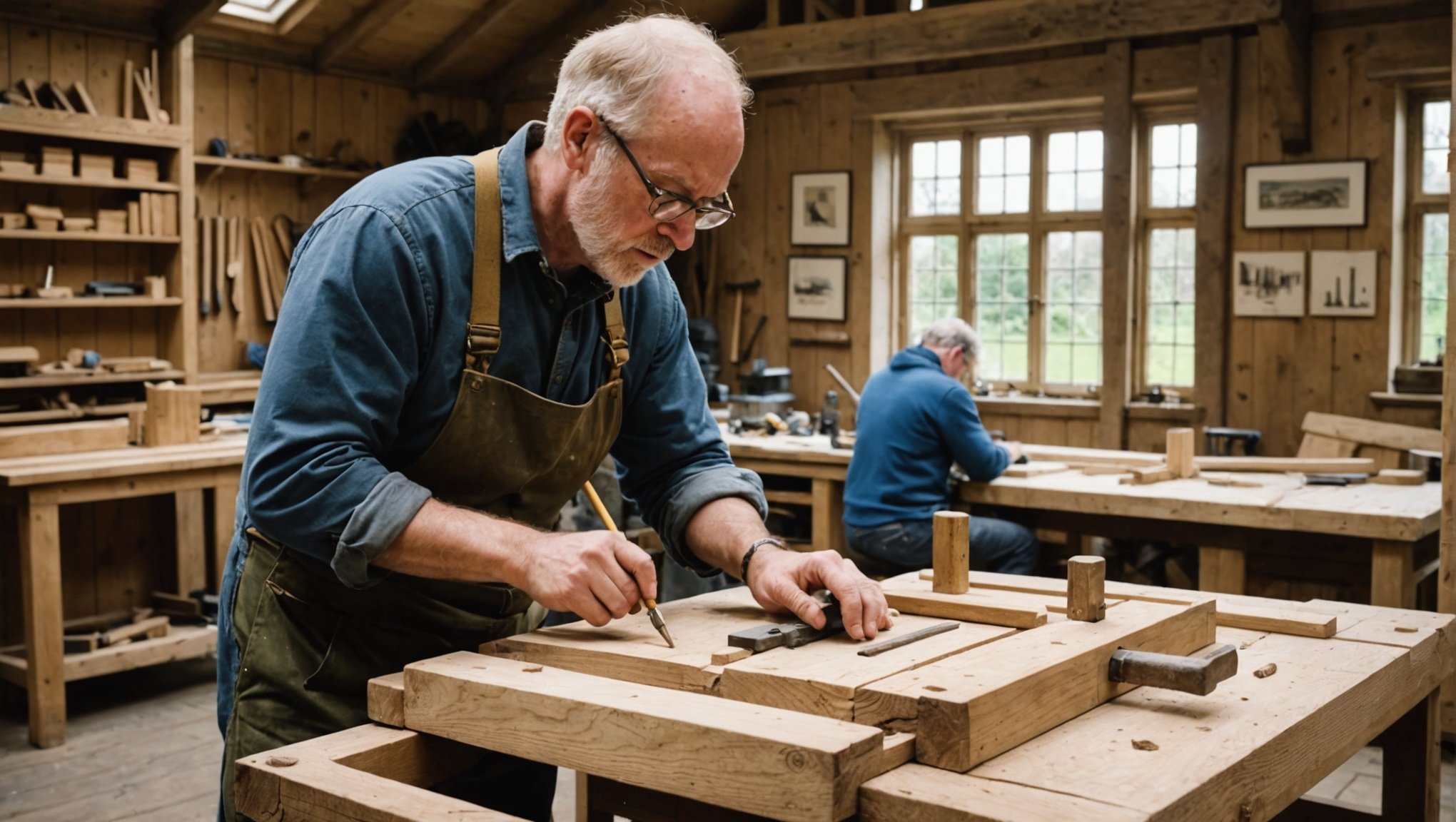Explore the fascinating world of traditional British carpentry. These hands-on workshops offer adventurous tourists a unique opportunity to learn time-honored techniques from skilled artisans. Experience the satisfaction of crafting beautiful wooden pieces while immersing yourself in British craftsmanship. Whether you're a complete novice or an experienced woodworker, these workshops provide the perfect blend of skill-building and cultural insight. Get ready to connect with the rich heritage of carpentry and create lasting memories, one wooden project at a time.
Overview of Traditional British Carpentry Workshops
Traditional British carpentry is a timeless craft that embodies the rich history and artistry of woodworking in the UK. These workshops offer a unique glimpse into the skills and techniques passed down through generations. For those curious about woodworking, these hands-on experiences provide an opportunity to learn directly from skilled artisans.
Topic to read : Discover the Rich Legacy of the British Press: Engaging Guided Tours for History-Loving Tourists
Workshop Offerings
Tourists can immerse themselves in a variety of workshops that cater to different interests and skill levels. From basic woodworking skills to more advanced techniques, these sessions are designed to be inclusive and educational. Participants can expect to work with authentic tools and materials, gaining a deeper appreciation for the craftsmanship involved in traditional British carpentry.
Benefits of Participation
Engaging in these workshops offers numerous benefits. Firstly, they provide a hands-on experience that enhances understanding and retention of skills. Secondly, they allow participants to create their own handcrafted items, which can be a rewarding and memorable souvenir. Additionally, these workshops foster a sense of community and connection with fellow enthusiasts, creating an enriching environment for learning and sharing.
Also to see : Discover the Best Guided Tours Unraveling British Cold War Espionage Secrets
Types of Carpentry Techniques Covered
Traditional British carpentry workshops are a treasure trove of carpentry techniques, offering insights into age-old woodworking skills that have stood the test of time. Participants can delve into a variety of methods, each with its own historical context and relevance.
Joinery
Joinery is a cornerstone of traditional carpentry, focusing on the art of connecting wood without nails or screws. This technique requires precision and patience, making it suitable for those with intermediate to advanced woodworking skills. Historically, joinery has been crucial in constructing durable and aesthetically pleasing structures, showcasing the elegance of traditional methods.
Green Woodworking
Green woodworking involves crafting items from freshly cut wood, a method that dates back centuries. It is accessible to beginners due to its reliance on simple tools and techniques. This approach emphasises sustainability and resourcefulness, aligning with modern environmental consciousness while honouring traditional methods.
Furniture Making
Furniture making combines various carpentry techniques to create functional and beautiful pieces. This craft ranges from basic to advanced skill levels, allowing participants to explore their creativity. Historically, furniture making has been a vital aspect of carpentry, reflecting cultural influences and craftsmanship evolution over time.
Workshop Providers and Locations
Embarking on a journey into traditional British carpentry begins with choosing the right workshop providers. Across the UK, several reputable establishments offer these enriching experiences. From the bustling cities to the serene countryside, these workshops are strategically located to cater to diverse interests and preferences.
Reputable Workshop Providers
Some of the most renowned workshop providers include The London School of Furniture Making, known for its comprehensive courses, and The Green Wood Guild, which specialises in green woodworking techniques. These institutions are celebrated for their expert instructors and immersive learning environments, making them ideal for both locals and tourists.
Geographic Locations
Workshops are scattered throughout the UK, from the historic streets of London to the picturesque landscapes of the Lake District. This geographical diversity ensures that participants can choose a location that aligns with their travel plans and personal interests.
Accessibility and Travel Tips
For tourists eager to explore these workshops, consider proximity to major transport hubs such as airports and train stations. Many locations are easily accessible, with accommodations nearby. Planning ahead and researching travel options can enhance the overall experience, ensuring a seamless journey into the world of traditional British carpentry.
Scheduling and Pricing
Understanding the workshop schedules and pricing is crucial for planning your traditional British carpentry experience. Workshops often run on both weekends and weekdays, providing flexibility for participants. Weekend sessions are popular due to their convenience, while weekday workshops might offer a quieter, more personalised learning environment.
Pricing Breakdown
The pricing for these workshops varies depending on the type of session and its duration. Introductory classes might be more affordable, whereas advanced courses could require a higher investment due to the complexity and materials involved. Some workshops offer package deals or discounts for group bookings, making it more economical for friends or families to participate together.
Booking Process
Securing a spot in these workshops is straightforward but requires some planning. Early booking is recommended, especially for popular sessions, to ensure availability. Many providers offer online booking systems, allowing you to reserve your place with ease. Consider subscribing to newsletters or alerts from workshop providers to stay informed about new sessions and promotions. By understanding the scheduling and pricing, you can tailor your experience to fit your interests and budget, ensuring a rewarding journey into the world of traditional British carpentry.
Testimonials and Participant Experiences
Exploring the world of traditional British carpentry through workshops has left a lasting impression on many participants. Testimonials from attendees highlight the enriching nature of these experiences. Participants often express a deep appreciation for the skills and knowledge gained during their time in the workshops.
Compilation of Participant Testimonials
Many reviews emphasise the hands-on learning approach, which allows individuals to engage directly with the craft. Participants frequently mention the satisfaction of creating tangible items with their own hands, which serves as a testament to their newly acquired skills. The workshops are praised for their ability to cater to various skill levels, ensuring everyone can participate meaningfully.
Insights on the Overall Experience
Attendees often describe the workshops as transformative, noting how the immersive environment fosters a deeper understanding of traditional techniques. The camaraderie among participants is a common theme, with many enjoying the opportunity to connect with fellow enthusiasts. This sense of community enhances the learning experience, making it both educational and enjoyable.
Impact on Skills and Knowledge
Participants report significant improvements in their woodworking skills, attributing their progress to the expert guidance provided by instructors. The workshops not only teach practical techniques but also instil a greater appreciation for the artistry involved in traditional British carpentry.
Historical Insights into British Carpentry
The history of carpentry in Britain is a tapestry woven with centuries of traditional craftsmanship. This craft has evolved from simple, utilitarian structures to intricate works of art, reflecting the changing needs and aesthetics of society.
Evolution of Carpentry in Britain
Carpentry in Britain began with basic shelters and tools, evolving over time as techniques and materials improved. The Industrial Revolution marked a significant shift, introducing machinery that transformed woodworking processes. However, the essence of traditional craftsmanship remained, preserving the artistry and skill that define British carpentry.
Key Historical Figures
Several historical figures have left indelible marks on the history of carpentry. Thomas Chippendale, renowned for his elegant furniture designs, revolutionised the craft in the 18th century. Similarly, John Loughborough Pearson's architectural feats showcased the structural potential of wood, influencing generations of carpenters.
Cultural Significance in British Heritage
Carpentry holds profound cultural significance in British heritage, symbolising resilience and innovation. From medieval cathedrals to Victorian furniture, woodworking has been integral to the nation's architectural and artistic identity. This rich history continues to inspire contemporary artisans, bridging the past and present through enduring craftsmanship.
Tips for Adventurous Tourists
Embarking on a traditional British carpentry workshop is an exciting venture for adventurous tourists. Proper workshop preparation is key to ensuring a fulfilling experience. Here are some travel tips to make the most of your journey.
Workshop Preparation
Before attending a workshop, it's advisable to research the specific requirements of your chosen session. While most workshops provide essential tools and materials, bringing personal items like a sturdy apron and work gloves can enhance your comfort. Familiarise yourself with basic woodworking terminology to ease into the learning process.
Essential Tools and Materials
While workshops supply most equipment, adventurous tourists might consider packing a small toolkit with items like a tape measure, pencil, and notebook for jotting down notes. These tools can be useful for personal projects after the workshop, extending your learning beyond the classroom.
Additional Activities
Enhance your UK experience by exploring local attractions. Many workshop locations are near historical sites, offering a perfect opportunity to delve into British culture. Consider visiting nearby museums or participating in local festivals to enrich your stay. Engaging in these activities not only complements your carpentry adventure but also provides a broader perspective of the UK's rich heritage.
















